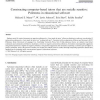Free Online Productivity Tools
i2Speak
i2Symbol
i2OCR
iTex2Img
iWeb2Print
iWeb2Shot
i2Type
iPdf2Split
iPdf2Merge
i2Bopomofo
i2Arabic
i2Style
i2Image
i2PDF
iLatex2Rtf
Sci2ools
IJMMS
2006
2006
Constructing computer-based tutors that are socially sensitive: Politeness in educational software
Students rated 16 tutorial statements on negative politeness (i.e., how much the tutor ``allows me freedom to make my own decisions'') and positive politeness (i.e., how much the tutor was ``working with me''). Consistent with an adaptation of Brown and Levinson's [1987. Politeness: Some Universals in Language Use. Cambridge University Press, New York] politeness theory, (a) students rated direct commands and commands attributed to machines as lowest in negative and positive politeness, (b) students rated guarded suggestions and guarded questions as highest in negative politeness, and guarded suggestions and statements expressing a common goal as highest in positive politeness, and (c) the pattern of results was stronger for students with low rather than high computing experience. Results have implications for designing polite conversational agents in educational software. r 2005 Elsevier Ltd. All rights reserved.
| Added | 12 Dec 2010 |
| Updated | 12 Dec 2010 |
| Type | Journal |
| Year | 2006 |
| Where | IJMMS |
| Authors | Richard E. Mayer, W. Lewis Johnson, Erin Shaw, Sahiba Sandhu |
Comments (0)

